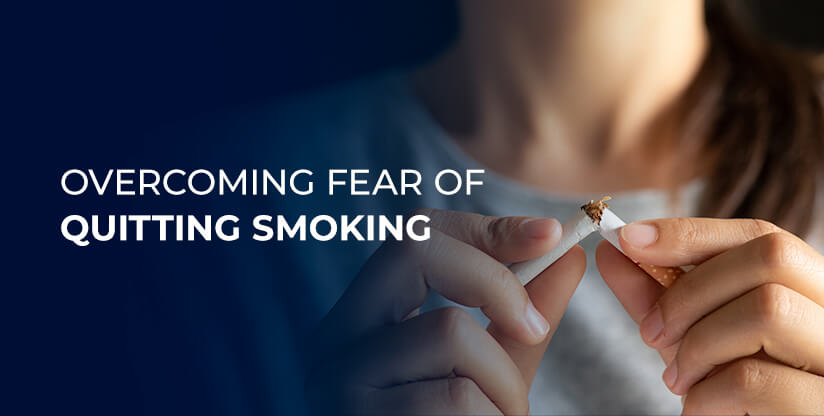- Jan 24
- Addiction

If you are among the 34 million U.S. adults who smoke cigarettes, know that you are not alone in your fear of quitting. In 2018, 55.1% of smokers said they had made a quit attempt in the past year, with only 7.5% succeeding. There are several reasons you may be hesitant to end the habit for the first time, from fear of stress to worries about withdrawal.
While the first try may not always be successful, know that recovery is possible. By learning healthy coping mechanisms to turn to instead of nicotine or marijuana, you can start feeling less afraid and more prepared to stop smoking. Learn how to overcome your fears and break the cycle once and for all.
Why You Might Feel Afraid
People often start smoking out of boredom or to deal with various challenges. You might doubt your ability to quit for several reasons.
- Stress: If you rely on cigarettes to loosen up during your day, you might worry about losing this release valve. It’s essential to remember that using nicotine to relax is only a temporary fix, and smoking exacerbates mental health conditions over time. One study found those who smoked were up to three times more likely to have clinical depression than people who never started the habit.
- Weight gain: Gaining weight is a common symptom of nicotine withdrawal. You might find you eat more after quitting because cigarettes suppress your appetite. Others turn to food to replace their nicotine addiction. However, even if you put on a few extra pounds, quitting smoking significantly improves your health and quality of life in many other ways.
- Cravings: You might want to quit smoking but enjoy it too much, which is a common symptom of nicotine withdrawal. While cravings are typical, there are various ways to resist temptations and replace smoking with a healthier, more enjoyable activity.
- Withdrawal symptoms: Nicotine and marijuana withdrawal commonly cause emotional and physical symptoms like anger, anxiety, irritability, headache and fatigue. You might be afraid to quit smoking due to these challenging symptoms, especially if you struggle with depression or anxiety.
- Addiction itself: Addiction also plays a significant role in keeping people smoking. Every time you light up, nicotine increases the feel-good chemical dopamine in your brain. Once the chemicals wear off, you’ll start craving more. Over time, your body will adapt to the nicotine, and you’ll need to smoke more to achieve the same desirable effects. Eventually, this perpetuates a cycle that can feel challenging to escape.
Aside from these worries, even the fear of the unknown might affect your decision to make a change. Fortunately, there are several ways you can replace these worries with optimism to change.
How to Overcome Your Fear of Quitting Smoking
While the above anxieties may initially deter you, you can combat them by learning how to lead a healthy, cigarette-free lifestyle. While it may take a few tries, look at every small victory as a success. Here are a few tips to combat your fear of quitting smoking.

1. Stress
While you may feel calmer after the first drag on a cigarette, the habit only harms your mental health over time.
According to one study, most participants reported less stress after quitting. Try these stress-management techniques to replace your smoking habit.
- Exercise: Moving your body through exercise is an excellent way to relieve stress. Virtually any form of exercise can help you feel calmer, from weightlifting to cycling, swimming and even gardening.
- Mindfulness: Deep breathing exercises and meditation are beneficial mindfulness routines to increase self-awareness and combat the triggers that might contribute to your nicotine addiction.
- Take a nature walk: Studies show being in nature can ease your mind and lift your mood, becoming an effective way to curb stress and negative feelings.
- Get good-quality sleep each night: Getting enough sleep can help you stay on an even keel throughout your day, allowing you to kick your smoking habit. Experts advise healthy adults need between seven and nine hours of sleep every night.
2. Weight Gain
Weight gain is another reason you might be afraid to quit smoking, but it shouldn’t deter you. Adding a couple of pounds is a fair trade for the health benefits of smoking cessation. You can reduce your risk of cardiovascular disease, chronic obstructive pulmonary disease and many types of cancer.
By preparing yourself for weight gain, there are ways to prevent it when you quit smoking. You might be more inclined to reach for food without constant smoking breaks, so keeping an array of healthy snacks on hand is essential.
Another simple way to combat weight gain is by getting outside and taking a 30-minute walk each day. Even walking up and down your stairs a few times in a row can help. Additional activity will benefit your physical and mental health and help you manage your weight after you quit smoking.
3. Addiction Cravings
Try a few tips to manage nicotine cravings and help you curb that fear:
- Avoid situations or people that remind you of smoking.
- Keep a healthy snack on hand.
- Reach out to a mental health helpline, support group or other addiction resources to help you quit smoking.
- Reduce substances like alcohol or caffeine, which can trigger nicotine cravings.
- Try nicotine replacement therapy, using a skin patch, lozenge or gum to help curb cravings and wean off nicotine with milder withdrawal symptoms than stopping abruptly.
Professional addiction treatment services can help you overcome your nicotine addiction and manage cravings and triggers that cause you to smoke.
4. Withdrawal
While nicotine withdrawal can be unpleasant, it is temporary. Most people only experience withdrawal symptoms for three to four weeks after quitting. The challenging emotions will likely intensify for the first week and then gradually subside.
Speaking with a mental health professional is a productive way to manage these feelings. Through cognitive behavioral therapy, a counselor can help you identify the reasons you want to smoke and why stopping seems intimidating. By gaining more self-awareness, you can keep on track with quitting substances and learning healthy coping mechanisms to replace the habit.
You might also journal, exercise or meditate to help you through your feelings or turn to friends and family at this time. Reward yourself when you quit. Remember that every step in the right direction counts as a win, and you can use positive reinforcement to help you through the process.
Reach out to Gateway Foundation for Help
As you consider these tips, try not to be hard on yourself if your first time attempting to quit isn’t successful. Many people need several tries to quit smoking permanently. Keep a positive mindset, and remember that you are not alone on your journey.
At Gateway Foundation, we are with you for life. Our addiction experts can help you combat fears and stressors through cognitive behavioral therapy and other evidence-based techniques. You can benefit from compassionate, discreet health professionals to help you overcome your smoking habit and enhance your quality of life.
To learn more about our addiction programs, contact us today.



